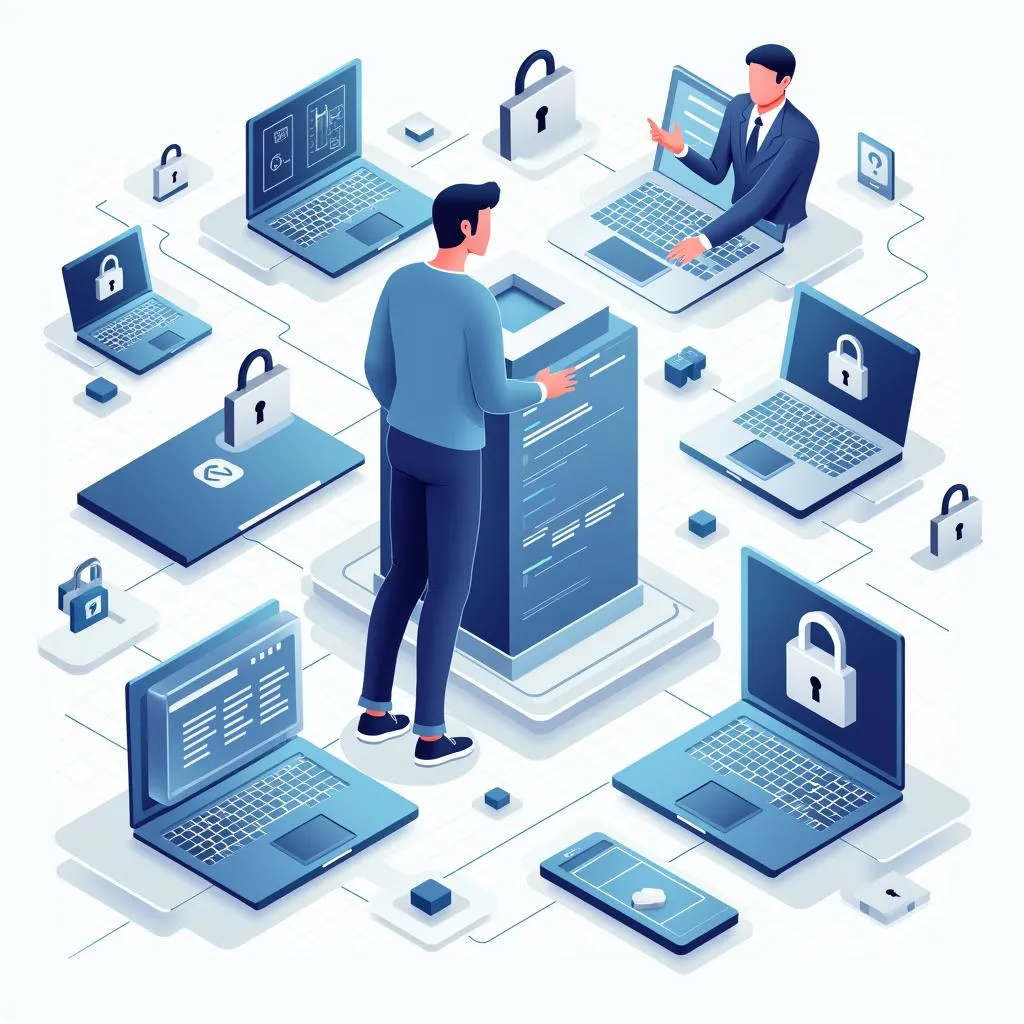In the PTE Speaking & Writing test, the Summarize Written Text task challenges test-takers to condense long passages into a single, coherent sentence. Topics related to cybercrime and digital security often appear in exams due to their growing relevance in modern society. In today’s article, we will provide you with valuable Summarize Written Text practice based on the topic “Cybercrime And Digital Security Strategies.” Not only will this help you improve your skills, but it will also give you a better understanding of the subject and its associated terminologies.
Additionally, this article contains realistic practice examples, modeled closely on actual PTE tests. You will also find in-depth analysis of sample answers to understand how to score higher on this task.
Importance of Cybercrime and Digital Security
In today’s digital age, the threat of cybercrime looms larger than ever. As our dependence on digital services grows, so does the need for robust cybersecurity strategies. Understanding online security measures and data privacy laws, especially in e-commerce contexts, has become indispensable for individuals and organizations alike. You can also deepen your knowledge on this by exploring some significant issues like Cybersecurity in e-commerce platforms.
 Cybersecurity measures and threats are becoming critical issues
Cybersecurity measures and threats are becoming critical issues
Example 1: Summarize Written Text Practice
Text:
With the increasing integration of digital technology into every aspect of human life, cybercrime has taken on unprecedented forms, affecting businesses, governments, and individuals alike. In response, organizations are developing advanced security strategies, such as encryption and multi-factor authentication, to safeguard sensitive data. On the legislative front, global efforts are underway to regulate online activities and protect personal information through stringent data privacy laws.
In one sentence, summarize the text.
Sample Responses and Evaluation
Band 90 (Perfect Response)
Sample:
As digital technology becomes more widespread, cybercrime grows more sophisticated, prompting companies to implement security strategies and leading governments to introduce strong data privacy regulations.
Analysis
- Content: The response captures the essence of the entire passage, mentioning both the development of security strategies and data privacy laws.
- Form: Consists of a single, complete sentence.
- Grammar: No errors in sentence structure or verb tense.
- Vocabulary: Terms like “cybercrime,” “security strategies,” and “data privacy” are accurately used to convey key information.
- Spelling: No spelling errors.
Band 79 (Good Response)
Sample:
The growth of cybercrime due to increased digitalization has led to companies employing security methods and governments enacting privacy laws.
Analysis
- Content: The core ideas are covered, though the explanation of security solutions could be more specific (e.g., encryption, multi-factor authentication).
- Form: Correct format of one sentence.
- Grammar: Grammatically sound with no mistakes.
- Vocabulary: Adequate use of terminology, though simpler language is employed.
- Spelling: Spelling is correct.
Band 65 (Satisfactory Response)
Sample:
Cybercrime is increasing, and businesses now protect data while governments work on making more regulations.
Analysis
- Content: Misses finer details such as encryption and multi-factor authentication, lacking specificity.
- Form: One sentence, correctly formatted.
- Grammar: Straightforward but grammatically correct.
- Vocabulary: Uses basic, less precise terms (“making more regulations” instead of “enacting privacy laws”).
- Spelling: No spelling errors.
Band 50 (Below Average Response)
Sample:
There is more cybercrime, and governments and companies are doing things to protect against it.
Analysis
- Content: Lacks important details. The sentence is too vague to convey the full meaning.
- Form: One sentence, though quite simplistic.
- Grammar: Simple grammatical structure; lacks complexity.
- Vocabulary: Childlike language, with no use of advanced terms like “cybersecurity” or “encryption.”
- Spelling: No spelling errors.
Example 2: Summarize Written Text Practice
Text:
Cybercrime has become a global issue, impacting millions around the world. Criminals exploit weaknesses in digital ecosystems, targeting both individual users and large organizations. Companies are spending more on resources to develop sophisticated security systems to mitigate these risks, while governments are continually updating legal frameworks to protect citizens’ data privacy.
In one sentence, summarize the text.
Sample Responses and Evaluation
Band 90 (Perfect Response)
Sample:
Cybercrime is a global concern, prompting businesses to invest in advanced security systems and governments to strengthen legal protections for data privacy.
Analysis
- Content: Comprehensive summary that addresses both business countermeasures and governmental legal responses.
- Form: Correctly structured in a single sentence.
- Grammar: No errors.
- Vocabulary: Excellent usage of terms such as “global concern,” “advanced security systems,” and “legal protections.”
- Spelling: Perfect.
If you’re curious about how these evolving cyber laws influence privacy rights on a global scale, check out this resource: Cybercrime and data privacy laws. It provides more insight into legal measures to combat cybercrime.
 Cybercrime legal frameworks for global security strategies
Cybercrime legal frameworks for global security strategies
Vocabulary and Grammar Analysis
Understanding the vocabulary related to cybercrime and digital security is essential when preparing for your PTE exam. Below are 10 important words from the passage along with their phonetic transcription, meanings, and example sentences.
-
Encryption /ɪnˈkrɪpʃən/
Definition: The process of converting data into a code to prevent unauthorized access.
Example: Companies implement encryption measures to protect their customers’ sensitive data. -
Authentication /ɔːˌθɛntɪˈkeɪʃən/
Definition: The process of verifying someone’s identity.
Example: Multi-factor authentication adds extra layers of security to user accounts. -
Mitigate /ˈmɪtɪˌɡeɪt/
Definition: To make something less severe, serious, or painful.
Example: Companies invest in firewalls and antivirus software to mitigate the risks of hacking. -
Data Privacy /ˈdeɪtə ˈpraɪvəsi/
Definition: The protection of personal information from unauthorized access.
Example: Data privacy laws help safeguard individuals’ personal information from cybercriminals. -
Legislative /ˈlɛdʒɪˌsleɪtɪv/
Definition: Pertaining to laws or lawmaking.
Example: Many countries have introduced legislative measures to combat cybercrime. -
Sophisticated /səˈfɪstɪˌkeɪtɪd/
Definition: Complex and advanced in design or function.
Example: Sophisticated malware can breach even the most secure systems. -
Exploit /ˈɛksplɔɪt/
Definition: To use a situation or person unfairly or take advantage of.
Example: Hackers often exploit vulnerabilities in outdated software. -
Framework /ˈfreɪmˌwɜːk/
Definition: A structure for supporting or enclosing something.
Example: The government is developing a regulatory framework for data protection. -
Breach /briːʧ/
Definition: An act of breaking or failing to observe a law, agreement, or code of conduct.
Example: A security breach can expose confidential information to the public. -
Resources /rɪˈsɔːrsɪz/
Definition: Supplies of tools, material, funding, or services available for a task.
Example: Organizations are allocating significant resources to develop more secure networks.
Conclusion
The Summarize Written Text task in the PTE test offers a prime opportunity for you to demonstrate your ability to condense complex information into concise, precise sentences. As shown in the examples above, topics like cybercrime and digital security strategies are increasingly common and relevant in modern discussion, particularly within the PTE testing framework. Keep practicing these tasks regularly to improve your performance, and don’t forget to explore more about digital security measures by commenting below with your challenges or experiences!